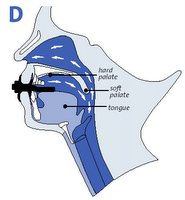
Alright. One post on how much I detest mouthbreathing was just not enough for me. So, herein I am going to try to investigate the historical status of the mouthbreather. I just want to understand where we went wrong.
Wikipedia has a useful entry on mouthbreathing, covering both the medical definition and the common impression of the behaviour. Note that I am obviously not the only one on this most-just crusade. Actually, I have found at least one supporter on the net.
However, wikipedia does not give me any information on when the term first entered use. So, I checked out dictionary.com…that veritable treasure-trove of idiomatic knowledge…and I got bupkis. Nadda. There was one definition, and it was simply concerning the mechanical/medical status of mouth breathing. There was nothing on the social appearances, or the negative impact of the behaviour.
I started to suspect a conspiracy. Could the mouthbreathers have allies high-up enough that they are preventing common-knowledge from being recorded? Could The Man be a mouth-breather?
Worried, I decided to re-start my search with a resource that features the “common” usages of terms. That’s right- the Double-Tongued Dictionary. I was delighted to find that the definition for “mouth-breather” was (rightly so):
mouth-breather n. a stupid person; a moron, dolt, imbecile. Related: English, Derogatory, Slang
What is even more useful about the DTD is the fact that the site provides a list of citations supporting their definition. This way, one can get a sense of when the term started to take on its meaning. In this case, the earliest citation of “mouth-breather” used in the manner described by the definition (after all, what is the definition of a word other than how it is used in a phrase?) was from 1944.
I was a little doubtful of this date, so I decided to check if it appeared at all earlier. Much earlier. I decided to search for “mouth breather” on EEBO. And once again, I got bupkis.
So it seems that the pathology of mouth-breathing was not discovered (or, dare I say it: created) until the current century. There was an etymology discussion on washingtonmonthly.com surrounding where the term may have originated. The earliest that this author could find of the use of the term was with regards to the physical effects of mouth breathing on hearing.
So I tried using FindForward’s “early century” search counter. The results gathered by the search for “mouth breather” suggest that the use of the term peaked during the 1940s. However, since this search does not allow me to actually see the data gathered, I can not say for sure if the results are relevant to my search.
The “later century” search saw some interesting variation in the use of the term (peaking in the early 80s), but once again, since it does not actually allow you to access the data, I can not determine the relevance. However, what is interesting is if you compare these results to a search of the term “mouthbreather” (one-word). The results peak around the same years. Once again, though, the fact that I cannot examine the data for myself makes the results dubious.

